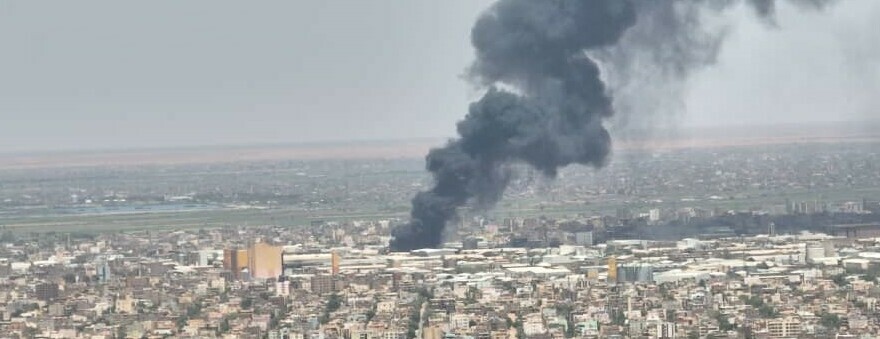As the war enters its second year, life in Bahri, Khartoum’s sister city across the Nile, has been characterized by a lack of water and electricity, alongside rampant killings, looting, arbitrary detentions, and food and service shortages. These challenges have completely disrupted daily life for the city’s residents, reflecting a year of hardship endured under constant bombardment.
For many residents, remaining in Khartoum amidst the conflict was not a choice but a necessity, as they couldn’t afford to relocate to safer areas. The war has devastated their livelihoods, forcing businesses to shut down and leaving homes vulnerable to looting, depriving them of resources crucial for survival.
“Since the war began, we’ve seen little presence of the Sudanese army in Bahri. Control over the city largely lies with the Rapid Support Forces (RSF), particularly in the Shambat area,” Mohammed Ibrahim, a resident of Shambat Al-Aradie neighborhood, told Radio Tamazuj.
Despite the challenges, food supplies are still available in central and Al-Ezba markets, thanks to traders operating in local stores. Many residents rely on financial support from family members abroad to make ends meet.
However, he highlighted that electricity supply remains unstable due to frequent issues at the power station, often disrupted by clashes. Prolonged power outages have been a common occurrence since the war began in April last year. Water supply has also been severely affected, with services cut off since the onset of the conflict.
Citizens now rely on a well located inside the Weeta water factory for drinking water. For other household needs, they rely on connections from sewage wells in newly constructed but uninhabited buildings.
In terms of security, Mohammed noted widespread theft of homes and vehicles, resulting in a situation where no one in Bahri currently owns a vehicle. Movement for residents has become restricted, primarily limited to acquiring food and drinking water. The only operational hospital is Haj Al-Safi Hospital, which offers some free services following the closure of the International Hospital.
Control over various parts of Bahri is mainly held by the Rapid Support Forces (RSF), especially in areas like Shambat (Al-Hilla, Al-Aradie), Al-Halfaya, Al-Ezirqab, and to the south, including neighbourhoods like Al-Danagla, Khatmiyah, and Al-Haj Yusuf.
Abdulghani Mohammed Ali, another Bahri resident, lamented the devastating impact of the war on the area, citing severe water scarcity and a heavy presence of the Rapid Support Forces (RSF) since the conflict’s onset. He described how residents have been forced to flee due to violations, looting, and indiscriminate shelling.
He noted, “Since the war began, Bahri has not received any food aid or humanitarian assistance, exacerbating water shortages. Residents now rely on makeshift wells for drinking water and risk fetching water from the river, fearing attacks from the direction of Omdurman.”
Abdulghani highlighted the closure of the International Hospital, targeted just 25 days ago, leading to increased outbreaks of disease and environmental disasters in areas like Al-Sha’abiya South and North, Al-Mazad, Hillat Khogali, and Al-Danagla. This raises concerns about potential epidemics in densely populated areas like Shambat Al-Hilla.
He further explained that food and supplies are brought in from Al-Haj Yusuf area, while electricity has been cut off for over a year from Al-Muasasa down to Al-Mak Nimir in the south. Areas north of Al-Muasasa experience intermittent electricity, causing challenges in storing medications, especially for diabetic patients.
Abdulghani also highlighted the theft of solar panels, worsening the situation by affecting medication preservation and phone charging, essential for many Bahri residents during these difficult times.
Mohammed Osman Ahmed, a member of the Supply and Water Bureau in Bahri Emergency Room, paints a grim picture of the situation in Bahri, describing it as “very bad.” Despite some stability in security, occasional indiscriminate shelling has claimed many lives, including a tragic incident where a shell killed a man, his wife, and severely injured their two daughters in Al-Deiom neighbourhood.
He explained that citizens rely on collective kitchens for complete meals, with the Emergency Room serving around 35,000 people and 6,000 families through 77 kitchens across the city and its outskirts. Ahmed mentioned plans to increase the number of kitchens to 80, with support primarily coming from donors and partners, despite interruptions in communication networks.
Regarding food distribution, Ahmed noted that supplies to Bahri South and Central are sourced from Al-Haj Yusuf area due to lower prices in Suk Sitta. However, internal markets operate with high prices, prompting volunteers to risk bringing supplies from Al-Haj Yusuf despite the threat of looting and robbery.
He emphasized, “The kitchens provide two meals per day with two types of food (beans and lentils) and sometimes peas. If the collective kitchens were to cease operation, famine would likely strike Bahri.”
Mohammed Osman appealed on behalf of the Emergency Room for the opening of safe passages to secure the lives of workers in collective kitchens, recognizing their significant humanitarian contribution.




